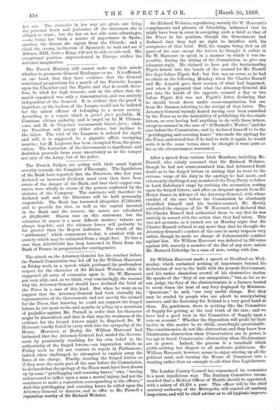After a speech from various Irish Members, including Mr. Parnell,
• who calmly assumed that Sir Richard Webster, though he had not cross-examined him, had intimated fresh doubt as to the forged letters in stating that he went to the extreme verge of his duty in the apology he had made, and vehemently challenged any member of the Tory Party to follow in Lord Salisbury's steps by reviving the accusation resting upon the forged letters ; and after an eloquent speech from Sir Henry James in defence of the Attorney-General, with whose conduct of the case before the Commission he absolutely identified himself and his brother-counsel, Mr. Morley reiterated the charges of Sir W. Harcourt, and declared that Sir Charles Russell had authorised them to say that he was entirely in accord with the action that they had taken. This was not accurate, as it turned out on Monday night that Sir Charles Russell refused to say more than that he thought the Attorney-General's conduct of the case in many respects very unfair, though he made no charge of dishonourable conduct against him. Sir William Harcourt was defeated by 286 votes against 206, scarcely a member of the Bar of any note, unless Mr. Bernard Coleridge be a man of note, voting with him..


















































 Previous page
Previous page